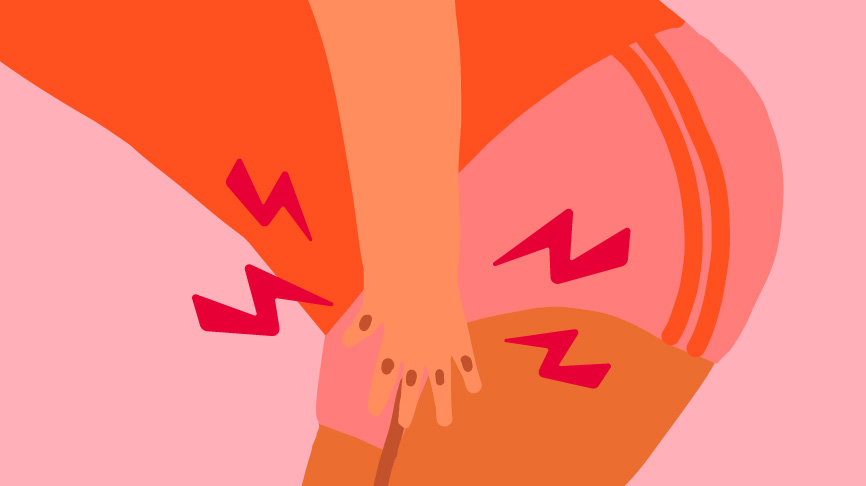Itchy, Itchy, Ow! Common Vaginal Allergies

If you have a vagina, most likely you’ve experienced some sort of vaginal or vulvar discomfort throughout your life.
From diaper rash to urinary tract infections to bacterial vaginosis to yeast infections, this is quite the sensitive set of equipment we’ve got.
It may come as no surprise to you that vaginas can have allergies. Maybe you’ve experienced this for yourself.
If you are currently experiencing mysterious bumps, rashes, itching, and redness, or have in the past, you may be wondering what the culprit is.
Let’s take a look at some of the symptoms of a vaginal allergic reaction and common things that people are allergic to.
Vaginal Allergy Symptoms
The tissue of the female genitals can do pretty incredible things. It can stretch to accommodate penises, toys, and menstrual products. It can experience incredible pleasure, as well as squeeze a baby out of it.
It’s also an incredibly porous and sensitive area that can develop allergies to all sorts of things.
Although we’re using the term “vaginal allergies”, many of these symptoms may appear on your vulva, anus, perineum, or surrounding areas, not just in the vaginal canal.
Here are some common symptoms of a vaginal allergy:
- Vaginal burning or itching
- Vaginal swelling
- Abnormal discharge
- Cracks on the skin of the vulva
- Blisters on the vulva
It’s important to note that an allergic reaction can have similar symptoms as many infections and STIs, so if you have any doubt about what is causing your symptoms you should seek medical advice.
Here are some common things that can cause a vaginal or vulvar allergic reaction:
Soaps and Vaginal Products
Not only can soaps and vaginal products throw off the delicate flora of the vulva and vagina, they can also cause allergic reactions.
If you’ve experienced a reaction to your soap, you may want to try an unscented kind of soap made for sensitive skin. Remember that you don’t have to wash inside your vagina, in fact, it’s discouraged.
For reactions to vaginal products like douches and speciality soaps or “cleaning” products, you may be better off cutting those out. The vagina for the most part is self-cleaning and doesn’t need those kinds of products!
Period Products
Some people have allergies to certain period products like pads and tampons. While you can find more sustainable versions, many of these products are full of chemicals and dyes, so it can be difficult to determine what you’re allergic to exactly.
A great way to help save yourself from period product irritation is to switch to a more sustainable and skin friendly product like a menstrual cup.
Your Sheets and Clothes
If you’ve experienced mystery itching and rashes that seem to pop up out of nowhere, you may be allergic to your bedding or clothes.
Certain materials can be difficult for people with sensitive skin, or you could have a reaction to the laundry soap you use.
An allergy to laundry soaps or certain materials may be more likely to pop up in the sensitive skin around your vulva.
Some ways you can combat this is to get gentle, unscented laundry soap, opt for natural fabrics like breathable cotton, or try going commando, aka sans panties.
Condoms and Dental Dams
Ever experienced itching, redness, and irritation right after having sex with a condom or dental dam? Then you may have a latex allergy or sensitivity.
A latex allergy may put a damper on your sex life for a moment, but luckily there are plenty of latex-free condoms out there to choose from!
If you have a severe latex allergy you may also experience other allergy symptoms like coughing, sneezing, a runny nose, wheezing, and shortness of breath.
Some other things to watch out for if you’ve experienced vaginal irritation is an allergy to certain lubes, sex toy materials, spermicides, and topical medications.
Your Partner
While rare, it is possible to be allergic to your partner’s fluids or semen. Human seminal plasma (HSP) hypersensitivity is essentially an allergy to a specific protein that’s found in semen.
You may also have a sensitivity to your partner’s sweat or products that they use.
What to Do About a Vaginal Allergy
Like any allergy, the best thing to do to prevent symptoms from coming up is to avoid exposure to the allergen.
Unfortunately, accidents happen, here are some things you can do to help ease vaginal discomfort from an allergy:
- Use an over the counter allergy cream with hydrocortisone. Be careful not to put this inside the vagina, do not use this for an extended period of time.
- For extreme itching you can take an oral antihistamine.
- Taking a cool sitz bath (low bath that just touches genital area)
- Get an allergy test to help determine the cause of your reaction
- Give it time. For mild allergies, symptoms should fade within a few hours to a couple days.
When to See a Doctor
Typically with allergies, symptoms will develop almost immediately after you’re exposed to the allergen. They will also usually subside within a couple of hours to a couple of days, as long as you stop exposure to the allergen.
If symptoms persist for more than a couple of days, cause severe discomfort, or if you are unsure about whether you have an allergy, an infection, or possibly a sexually transmitted infection, it’s always wise to go to a healthcare professional.
Be totally honest about your recent sexual history, all symptoms, any new products you’ve been using, and anything else that may be helpful for your provider to know about.

Natasha (she/her) is a full-spectrum doula and health+wellness copywriter. Her work focuses on deconstructing the shame, stigma, and barriers people carry around birth, sex, health, and beyond, to help people navigate through their lives with more education and empowerment. You can connect with Natasha on IG @natasha.s.weiss.


